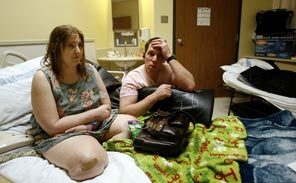Originally published May 11, 2010 at 10:00 PM | Page modified May 11, 2010 at 10:12 PM
![]() Comments (0)
Comments (0)
![]() E-mail article
E-mail article
![]() Print
Print
![]() Share
Share
Hospitals care for hundreds of Medicaid patients per year others won't take
A Seattle Times investigation has found 2,025 cases of Medicaid patients who no longer needed hospitalization but remained in hospital rooms for a month or longer because nursing homes or other facilities wouldn't take them. The $461 million in expenses are passed on as higher health-care costs.
Seattle Times staff reporter
ALAN BERNER / THE SEATTLE TIMES
As of Tuesday, Jeri Ringseth had lived in a room at St. Joseph Medical Center in Tacoma for 189 days because two dozen facilities have said they're unable to handle her chronic disabilities. Her husband, Gary, stays in the room most nights, sleeping on the cot in the background.
Behind the analysis
To estimate how many Medicaid patients stayed longer than medically necessary in Washington hospitals, The Seattle Times analyzed millions of patient-discharge files from a state Health Department database, the Comprehensive Hospital Abstract Reporting System. The data did not have names or information that could identify a person.
The Times also consulted with two epidemiologists and knowledgeable officials at the Washington State Hospital Association about our methods.
Only Medicaid patients 40 years or older were counted. Also excluded were: patients who were discharged routinely, those seriously injured in accidents, patients admitted or transferred because of psychiatric or rehabilitation needs, and those in comas or other conditions needing long hospitalization.
Michael J. Berens
![]()
There are no bars on her window or locks on the door, yet Jeri Ringseth considers herself a prisoner.
On Nov. 4, she was admitted to St. Joseph Medical Center in Tacoma with a diabetic blood-sugar imbalance, a life-threatening condition that over the years has caused both her legs to be amputated.
She was well enough within days for release to a nursing home. Instead, she had to wait, and as of Tuesday — after 189 days at St. Joseph — she still waits.
"Nobody wants me anymore," she says.
Ringseth, 41, is a low-income patient who suffers from chronic disabilities. She's too sick to care for herself and not well-off enough to pay for a private nursing home or other facility.
She's one of hundreds of Medicaid patients in Washington state each year who — despite no longer needing hospitalization — have occupied hospital rooms for a month or longer while trying to find a nursing home or other facility to take them in.
A Seattle Times investigation has found at least 2,025 such cases from 2000 to 2008. Overall price tag: $461 million.
Although written off as charity care, those costs are passed on to those who do pay for their care, according to the Washington State Hospital Association.
Increasingly, Washington hospitals have become way stations for the medically undesirable — a growing population of seriously ill or disabled residents who receive Medicaid, the government's insurance program for the poor.
At Virginia Mason Medical Center, for example, a 55-year-old man diagnosed and treated for a bone infection racked up 109 days and $333,000 in expenses before entering a nursing home.
At Harborview Medical Center, a 62-year-old cardiac patient waited 234 days before a Seattle nursing home agreed to take him in. The hospital tallied $1 million in uncompensated expenses.
The Times found two cases of patients living in the hospital for nearly a year while seeking outplacement.
Operators of nursing homes and adult-family homes say they often lose money caring for Medicaid patients.
Few cases are more complex or troubling than that of Ringseth. She was featured this year in "Seniors for Sale," an investigation into adult-family homes, which provide spare bedrooms and care for the old or frail who otherwise might have to live in nursing homes.
The investigation revealed that thousands of vulnerable adults have been exploited or mistreated by profiteers and amateur caregivers inside the state-licensed homes, sometimes with fatal results.
The investigation found numerous cases of private-pay seniors being marketed as good investments by owners selling their adult-family homes. Ringseth represents the other side of the coin, someone whose care is paid by the public. Based on complex Medicaid rules, the state Department of Social and Health Services established a fee for how much to pay for Ringseth's care.
More than two dozen long-term-care facilities have rejected Ringseth. For many, the compensation simply is too low.
"Huge gap" in compensation
Surrounded by stuffed animals and coloring books, Ringseth stares out the oval window of her ninth-floor hospital room and sometimes pretends that she is a princess in a tower waiting to be rescued.
She is childlike in many ways, bound by physical and mental disabilities. She has the basic skills of a third-grader. Besides losing both legs to severe diabetes, she has a shattered hip so brittle that it's beyond repair.
The Times followed Ringseth for more than a year through stints at a state psychiatric institution, a nursing home and an adult-family home. Its owner abandoned Ringseth at St. Joseph hospital last year, saying she was unable to meet her medical needs.
Ringseth now occupies a room that, if billed to private insurance, would bring in $1,700 a day. Instead, the hospital receives $169.30 from state Medicaid.
Her husband of 16 years, Gary, works full time at a pizza shop for $9 an hour. He's unable to care for his wife, who requires constant monitoring. He often stays the night in her room, sleeping on a foldout bed.
So far, her uncompensated hospital care totals "several hundred thousands of dollars," hospital spokesman Gale Robinette said. "There is a huge gap for what Medicaid reimburses and actual costs."
This financial gap has made Jeri Ringseth a tough sell to nursing homes. The Franciscan Health System chain of five hospitals and clinics, including St. Joseph, has at least five other patients in the same predicament as Ringseth.
For months, Ringseth remained optimistic. She wheeled herself around hospital corridors, visiting the cafeteria or waiting by the parking-garage elevator when expecting visitors. With a smile, she greeted staffers by name.
"I am going to be out of here by my birthday," she would tell everybody.
"Where do they all go?"
Nursing homes are legally prohibited from denying care based on income. But patients can be turned away if a facility is "unable to safely meet the patient's needs."
Officially, every nursing home or assisted-living facility involved in Ringseth's case has invoked this exemption.
Few long-term-care facilities are staffed or trained to deal with patients who have both serious mental and physical disabilities, said Terry Marker, assistant director of Home and Community Services Division at DSHS.
"We can deal with the medical issues but [not] the other dynamics, like mental health," Marker said. "We don't have nursing homes that specialize in that population.
"In the long term, we are going to have to get specialty homes. We are going to have to work with and recruit providers who are willing to provide this care — and we will have to pay them."
As an experiment, Washington has licensed a handful of adult-family homes as specialty-care homes, focusing only on physical disabilities, not mental. They are required to be owned and staffed by a nurse.
Currently, there are no requirements for a minimum level of employees at the state's other 2,860 adult homes.
Medicaid rates are based on patients' medical condition and where they stay.
In Ringseth's case, the flat-rate scale begins at $60.10 a day for an adult-family home and $79 for an assisted-living facility with a private room.
A nursing home will receive about $180 for a patient like Ringseth, said Gary Weeks, director of Washington Health Care Association, which represents nursing homes.
"Nursing homes lose money on many Medicaid patients," Weeks said.
DSHS officials warn that unprecedented numbers of seniors on Medicaid will flood the health-care system in the next 15 years.
"The issue here is where do they all go?" said Richard Kellogg, director of Integrated Health Services at DSHS.
"Anywhere but here"
On March 30, Ringseth was excited as she prepared to transfer to a Gig Harbor nursing home. She rose early, packed and scooted into her wheelchair and waited to be escorted to a transport van. Then the phone rang. Nursing-home officials had changed their minds.
"I'm scared that I may never get out of here," she told a reporter the next day.
Afterward, she took a turn for the worse.
Hospital officials said they were stunned by Ringseth's medical decline, almost as if she had given up.
"It breaks your heart, frankly," spokesman Robinette said.
Ringseth stopped eating, saying it made her nauseated. Doctors eventually diagnosed a digestive problem. Last week, they put a feeding tube in her stomach. Liquid meals are pushed into her body.
Ringseth stays in bed for the most part now and watches television — especially on Wednesday nights when she catches her favorite: "Dog the Bounty Hunter," a reality show about an ex-con nicknamed Dog who, with his wife, tracks down fugitives.
"I want to catch bad guys," she said. "I want to go anywhere but here."
The feeding tube may help in more ways than one, Gary Ringseth said last week.
"A doctor told me that a feeding tube means that a nursing home won't have to worry about what Jeri's eating," he said. "It will be easier to provide her care. It will make her more desirable."
Today, Wednesday, is Ringseth's birthday. She still waits.
Michael J. Berens: mberens@seattletimes.com or 206-464-2288
Exploiting the aged and frail in Washington's adult family Homes
More Seniors for sale headlines...

general classifieds
Garage & estate salesFurniture & home furnishings
Electronics
just listed
More listings
POST A FREE LISTING






 Series home
Series home